沪教版牛津英语高二下 Unit (1)知识点讲解+练习
- 格式:doc
- 大小:102.00 KB
- 文档页数:11
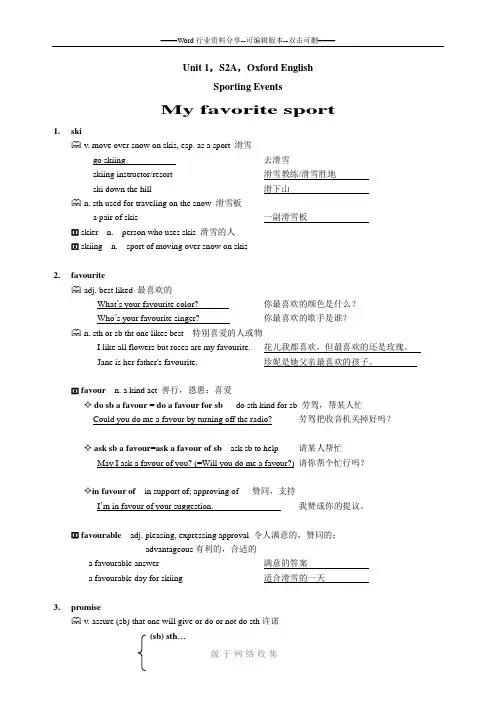
Unit 1,S2A,Oxford EnglishSporting EventsMy favorite sport1.skiv. move over snow on skis, esp. as a sport 滑雪go skiing 去滑雪skiing instructor/resort 滑雪教练/滑雪胜地ski down the hill 滑下山n. sth used for traveling on the snow 滑雪板a pair of skis 一副滑雪板▪ skier n. person who uses skis 滑雪的人▪ skiing n. sport of moving over snow on skis2.favouriteadj. best liked 最喜欢的What’s your favourite color? 你最喜欢的颜色是什么?Who’s your favourite singer? 你最喜欢的歌手是谁?n. sth or sb tht one likes best 特别喜爱的人或物I like all flowers but roses are my favourite. 花儿我都喜欢,但最喜欢的还是玫瑰。
Jane is her father's favourite. 珍妮是她父亲最喜欢的孩子。
▪favour n. a kind act 善行,恩惠;喜爱✧ do sb a favour = do a favour for sb do sth kind for sb 劳驾,帮某人忙Could you do me a favour by turning off the radio? 劳驾把收音机关掉好吗?✧ask sb a favour=ask a favour of sb ask sb to help 请某人帮忙May I ask a favour of you? (=Will you do me a favour?) 请你帮个忙行吗?✧in favour of in support of; approving of 赞同,支持I’m in favour of your suggestion. 我赞成你的提议。
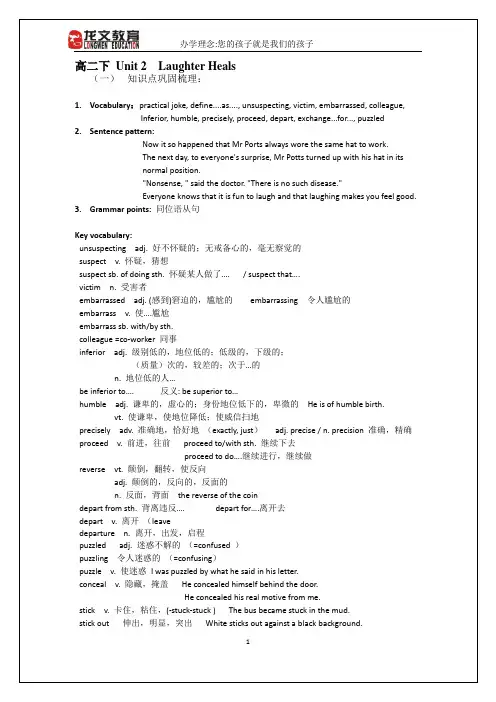
高二下Unit 2 Laughter Heals(一)知识点巩固梳理:1.Vocabulary:practical joke, define....as...., unsuspecting, victim, embarrassed, colleague,Inferior, humble, precisely, proceed, depart, exchange...for..., puzzled2.Sentence pattern:Now it so happened that Mr Ports always wore the same hat to work.The next day, to everyone's surprise, Mr Potts turned up with his hat in itsnormal position."Nonsense, " said the doctor. "There is no such disease."Everyone knows that it is fun to laugh and that laughing makes you feel good.3.Grammar points:同位语从句Key vocabulary:unsuspecting adj. 好不怀疑的;无戒备心的,毫无察觉的suspect v. 怀疑,猜想suspect sb. of doing sth. 怀疑某人做了…. / suspect that….victim n. 受害者embarrassed adj. (感到)窘迫的,尴尬的embarrassing 令人尴尬的embarrass v. 使….尴尬embarrass sb. with/by sth.colleague =co-worker 同事inferior adj. 级别低的,地位低的;低级的,下级的;(质量)次的,较差的;次于…的n. 地位低的人…be inferior to…. 反义: be superior to…humble adj. 谦卑的,虚心的;身份地位低下的,卑微的He is of humble birth.vt. 使谦卑,使地位降低;使威信扫地precisely adv. 准确地,恰好地(exactly, just)adj. precise / n. precision 准确,精确proceed v. 前进,往前proceed to/with sth. 继续下去proceed to do….继续进行,继续做reverse vt. 颠倒,翻转,使反向adj. 颠倒的,反向的,反面的n. 反面,背面the reverse of the coindepart from sth. 背离违反…. depart for….离开去depart v. 离开(leavedeparture n. 离开,出发,启程puzzled adj. 迷惑不解的(=confused )puzzling 令人迷惑的(=confusing)puzzle v. 使迷惑I was puzzled by what he said in his letter.conceal v. 隐藏,掩盖He concealed himself behind the door.He concealed his real motive from me.stick v. 卡住,粘住,(-stuck-stuck ) The bus became stuck in the mud.stick out 伸出,明显,突出White sticks out against a black background.stick to sth. 坚持,坚守(规则,诺言)alternate adj. 间隔的,轮流的,交替的The team held a meeting on alternate Wednesday. 每隔一个星期三开一次会。
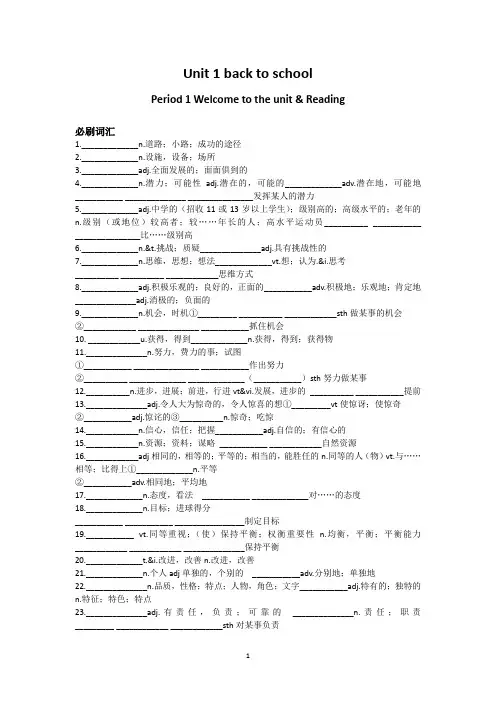
Unit 1 back to schoolPeriod 1 Welcome to the unit & Reading必刷词汇1._____________n.道路;小路;成功的途径2._____________n.设施,设备;场所3._____________adj.全面发展的;面面俱到的4._____________n.潜力;可能性adj.潜在的,可能的_____________adv.潜在地,可能地___________ ______________ _______________发挥某人的潜力5._____________adj.中学的(招收11或13岁以上学生);级别高的;高级水平的;老年的n.级别(或地位)较高者;较……年长的人;高水平运动员__________ ___________ _______________比……级别高6._____________n.&t.挑战;质疑______________adj.具有挑战性的7._____________n.思维,思想;想法_____________vt.想;认为.&i.思考__________ __________ ____________思维方式8._____________adj.积极乐观的;良好的,正面的___________adv.积极地;乐观地;肯定地______________adj.消极的;负面的9._____________n.机会,时机①_________ __________ ____________sth做某事的机会②____________ ______________ ___________抓住机会10.____________u.获得,得到_____________n.获得,得到;获得物11.______________n.努力,费力的事;试图①___________ _______________ ___________作出努力②__________ _____________ _____________(___________)sth努力做某事12.__________n.进步,进展;前进,行进vt&vi.发展,进步的__________ ___________提前13.______________adj.令人大为惊奇的,令人惊喜的想①_________vt使惊讶;使惊奇②___________adj.惊诧的③__________n.惊奇;吃惊14.____________n.信心,信任;把握___________adj.自信的;有信心的15.____________n.资源;资料;谋略___________ ____________自然资源16.____________adj相同的,相等的;平等的;相当的,能胜任的n.同等的人(物)vt.与……相等;比得上①_____________n.平等②___________adv.相同地;平均地17._____________n.态度,看法___________ _____________对……的态度18._____________n.目标;进球得分___________ ___________ ________________制定目标19.___________ vt.同等重视;(使)保持平衡;权衡重要性n.均衡,平衡;平衡能力____________ ____________ ______________保持平衡20._____________t.&i.改进,改善n.改进,改善21._____________n.个人adj单独的,个别的___________adv.分别地;单独地22.______________n.品质,性格;特点;人物,角色;文字___________adj.特有的;独特的n.特征;特色;特点23.______________adj.有责任,负责;可靠的______________n.责任;职责_________ ____________ ____________sth对某事负责24._____________adv.(时间、空间)向前;提前_______ ___________先走;请吧;开始做25._____________adj.(学校)为11或13岁以下儿童设立的;地位(或级别)低的;青少年的n.职位较低者;青少年运动员26.______________adv.向将来;向前;进展,前进__________ _______ _____盼望,期待27.___________adj.自主的,有主见的;自立的①___________n.独立;自主②___________adv.独立地28.___________ ______________存在,在于29.rise to________________30._________ ___________ __________起作用,有影响31.___________ ___________ __________ ________充分利用,尽情享受32.___________ ___________ ___________利用33.__________ ____________ __________ ___________最后但同样重要的核心词汇1、potential①n.[U]潜力;可能性;潜在性;潜能常用搭配the potential for(doing)sth(做)某事的可能性/潜力have the potential to do sth有潜力做某事realize/achieve/fulfil one's(full)potential 发挥某人的(全部)潜能。
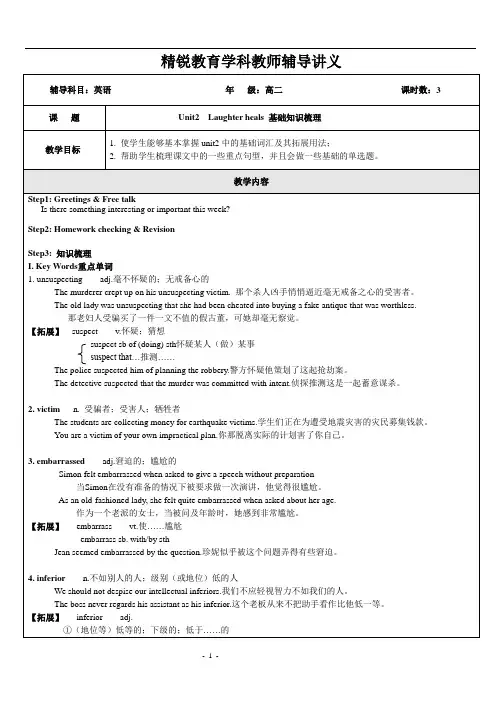
精锐教育学科教师辅导讲义Wherever I am,I do not feel inferior to others.无论我在哪,都不感到低人一等。
②(质量等)次的;较差的;次于……的Synthetic fabric is inferior to cotton fabric.合成纤维织物不如棉织品好。
5. humble adj. 谦卑的;虚心的Many famous people are surprisingly humble.许多知名人士都出奇地谦恭。
Knowledge makes one humble, while ignorance makes one proud.博学使人谦逊,无知使人骄傲。
【拓展】adj.(身份,地位等)低下的,卑微的He is of humble birth.他出身卑微。
vt.使谦卑,使地位降低;使威信扫地He had to humble himself in the presence of the boss.他在老板面前只得低声下气。
His failure in the competition humbled him.竞赛失利使他丢了脸。
6. precisely adv.精确地;恰好地The phone rang at precisely 9 o'clock.电话恰好在九点整响起。
I can't remember precisely what happened.我记不准所发生的事情了。
【拓展】precise adj.准确的;精确的He made a precise record of events.他对事件做了准确的记载。
precision n.准确;精确Your report lacks precision.你的报告不够准确。
7. proceed v.前进;前往The project is proceeding as planned.工程正在按计划进行。

高二下Unit 1 What is beauty?1. Vocabulary : former, lecturer, compliment, look one ’ s best, keep fit, regardless of, emphasisfit, current, stretch, ridiculous, endure, considerable, free to do sth .2. Sentence pattern:And, to what lengths can or should we go to make ourselves more beautiful?Sue, perhaps we could start with you .I think it ’ s up to everyone to decide what is right for them, butSeldom do people think about the real dangers of .3.Grammar points: Inversion 倒装Key Vocabulary:former以前的,从前的formerlythe former前者the latter 后者adv. 以前,从前The company formerly belonged to an international banking group.lecturer 讲师lecture 讲座compliment v. & n.赞扬,称赞compliment on sth./ compliment sb. on sth.put/place/lay emphasis on sth. 强调emphasize v. 强调fit大小、尺寸合适;吻合,协调suit 合乎需要、口味、性格、条件、地位;衣着打扮等式样、颜色、口味等适合match 多指两样东西或多样同类东西的搭配合适或相配合理keep fit=keep healthycurrent adj. 当前的,现行的;通用的,通行的current affairs 时事stretch v. & n. 伸长,伸展,拉伸stretcher 担架ridiculous 荒谬的,可笑的endure v. 忍受,忍耐(近义词: bear, stand, tolerate, put up with)considerable 相当多的,相当大的considerate 体贴的,替人着想的point n. 目的,意义there is (no) point (in) doing sth.小数点,分数,得分v. 指出,指向point out / point to/ point atalter v. 改变,变更alteration n.horrendous 可怕的issue n. 重要议题,争议的问题;出版发行物v. (报刊)发行,出版,颁布look one ’ s best看上去最美regardless of 不管free to do 随心所欲做set out vt. 述,阐明 ; 出发,开始set out to do sth. 着手做某事go to great lengths to do 为了达到目的全力以赴做. at length 最终,充分的go to the length of doing 到 .地步,竟然,甚至于in order to../ so as toin order that/ so that...start with you从你开始thank sb. for因为 . 而感thanks to =because of= as a result of= due to.. 因为,由于cosmetic surgery整容外科手术cosmetician 化妆师,美容师up to: ①从事于I don’ t know what he is up to.②胜任He is not up to his work.③适于The quality of the construction is not up to the standard.④直到I haven’ t heard from him up to now.deal with处理,应付deal in出售,经营disorder n. 混乱,无次序sb. happen to do某人碰巧做 .It happens/happened that碰巧发生perspective n. 视角、观点,远景in a..perspective 以 .的视角观点来看in/ out of perspective合比例/不合比例be used to doing / be used to do/ used to doused to do---否定: used not to/ usedn’ tdidnto’ t use toquaint adj. 离奇的,古色古香的custom 风俗,习俗habit 个人习惯tradition传统practice惯例,惯常的做法judge from/by根据. 来判断obsession n. 沉迷,迷恋be obsessed with 对⋯迷恋倒装的情况:1. 在以 never, little, hardly, not only, few, not, seldom等否定副词开头的句子中,采用部分倒装。
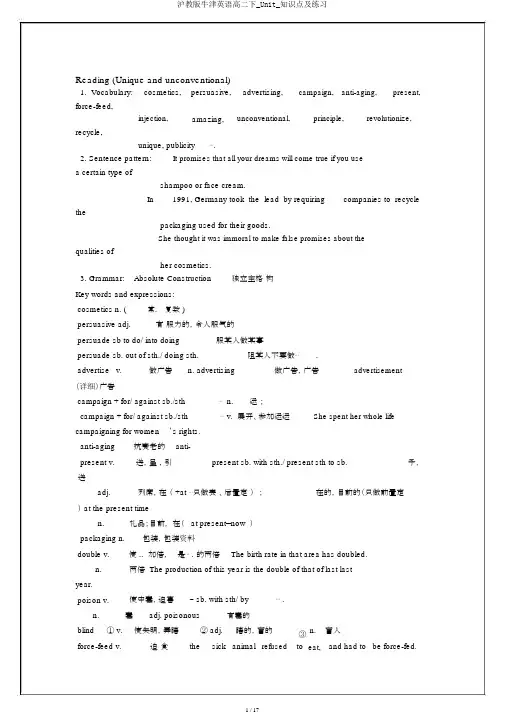
Reading (Unique and unconventional)1. Vocabulary:cosmetics,persuasive,advertising,campaign,anti-aging,present, force-feed,injection,amazing,unconventional,principle,revolutionize, recycle,unique, publicity⋯.2. Sentence pattern:It promises that all your dreams will come true if you usea certain type ofIn shampoo or face cream.1991, Germany took the lead by requiring companies to recyclethepackaging used for their goods.She thought it was immoral to make false promises about thequalities ofher cosmetics.3. Grammar: Absolute Construction独立主格构Key words and expressions:cosmetics n. (常.复数)persuasive adj.有服力的,令人服气的persuade sb to do/ into doing服某人做某事persuade sb. out of sth./ doing sth.阻某人不要做⋯.advertise v.做广告n. advertising做广告,广告advertisement (详细)广告campaign + for/ against sb./sth campaign + for/ against sb./sth campaigning for women’s rights. anti-aging抗衰老的anti-present v.送,呈,引⋯ n.运;⋯ v. 展开、参加运运She spent her whole life present sb. with sth./ present sth to sb.予,送adj.列席,在( +at ⋯只做表、后置定);在的,目前的(只做前置定) at the present timen.礼品;目前,在( at present=now )packaging n.包装,包装资料double v.使..加倍,是⋯.的两倍The birth rate in that area has doubled.n.两倍 The production of this year is the double of that of last lastyear.poison v.n.blind① v. force-feed v.使中毒,迫害~ sb. with sth/ by⋯.毒adj. poisonous有毒的使失明,弄瞎② adj.瞎的,盲的迫食the sick animal refused③ton.eat,盲人and had to be force-fed.injection n. 注射 ------v.inject⋯注射;投入( 金) ;增添,增添(某种品 )drip v.滴入amazing 令人诧异的,令人欣喜的unconventional adj. 打破 的, 奇特的 --------反 : conventional因循保守的principle n.,原 、prosper v. 繁华,使 旺adj. prosperousn. prosperityrevolutionize v. 改革,革命 n. revolutionreform n. & v.改革limitation n. 限制,缺点 ------v. & n. limit recycle v. 回收,再利用 refill v.再装 (灌 )unique adj. 唯一无二的,独到的Every snowflakeis unique---no tow are the same.每一瓣雪花都是唯一无二的。
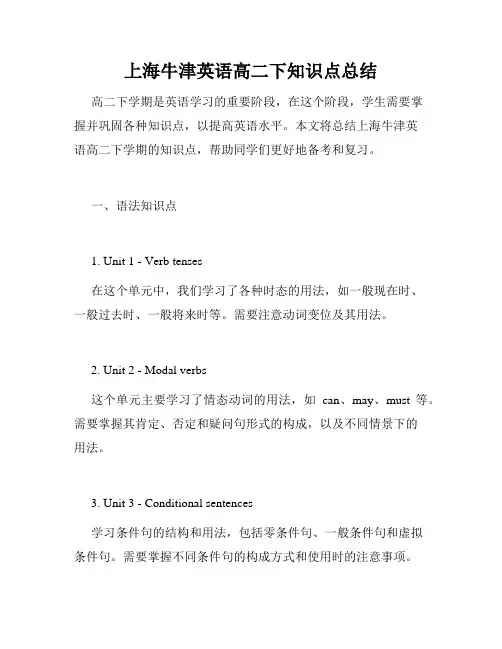
上海牛津英语高二下知识点总结高二下学期是英语学习的重要阶段,在这个阶段,学生需要掌握并巩固各种知识点,以提高英语水平。
本文将总结上海牛津英语高二下学期的知识点,帮助同学们更好地备考和复习。
一、语法知识点1. Unit 1 - Verb tenses在这个单元中,我们学习了各种时态的用法,如一般现在时、一般过去时、一般将来时等。
需要注意动词变位及其用法。
2. Unit 2 - Modal verbs这个单元主要学习了情态动词的用法,如can、may、must等。
需要掌握其肯定、否定和疑问句形式的构成,以及不同情景下的用法。
3. Unit 3 - Conditional sentences学习条件句的结构和用法,包括零条件句、一般条件句和虚拟条件句。
需要掌握不同条件句的构成方式和使用时的注意事项。
4. Unit 4 - Passive voice学习被动语态的构成和用法,需要理解主动语态与被动语态的转换,以及不同时态下的被动语态形式。
5. Unit 5 - Reported speech学习间接引语的用法,即将直接引语转换成间接引语的方式,包括陈述句、疑问句和祈使句的转换方法。
6. Unit 6 - Adjectives and adverbs学习形容词和副词的用法,包括比较级和最高级的构成方法,以及修饰名词和动词的不同用法。
二、阅读技巧和写作技巧1. 阅读技巧高二下学期的阅读主要包括理解和分析一些文章、短篇故事以及文章中的词汇和句子结构。
学生需要学会阅读理解,捕捉关键信息和理解文章的上下文。
2. 写作技巧在写作方面,学生需要掌握叙述、说明和议论文的写作技巧。
需要注意段落的结构,使用适当的连接词和过渡词,保持语句的连贯性和清晰性。
三、词汇和短语1. 单词记忆学生需要掌握并记忆高二下学期所学的重点词汇,包括名词、动词、形容词、副词等,以及一些常用短语的使用。
2. 词汇拓展扩大词汇量,学习一些同义词、反义词、词组和习惯用法,以便在日常学习和写作中更加灵活地运用。
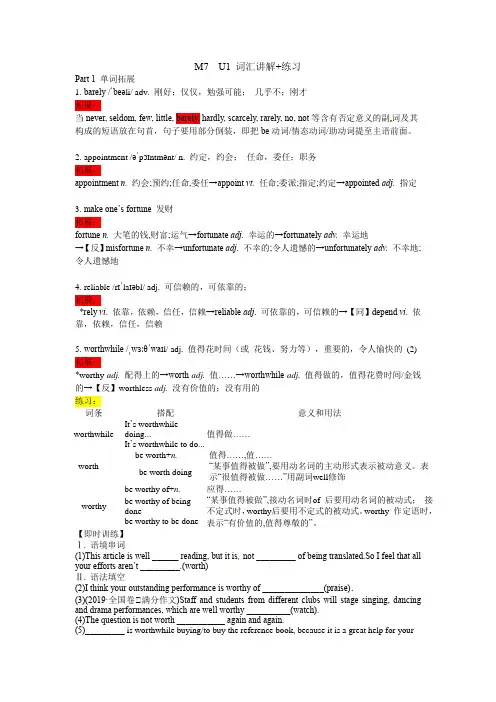
M7 U1 词汇讲解+练习Part 1 单词拓展1.barely /ˈbeəli/ adv. 刚好;仅仅,勉强可能;几乎不;刚才拓展:当never, seldom, few, little, barely, hardly, scarcely, rarely, no, not 等含有否定意义的副词及其构成的短语放在句首,句子要用部分倒装,即把be动词/情态动词/助动词提至主语前面。
2.appointment /əˈpɔɪntmənt/ n. 约定,约会;任命,委任;职务拓展:appointment n.约会;预约;任命,委任→appoint vt.任命;委派;指定;约定→appointed adj.指定3.make one’s fortune 发财拓展:fortune n.大笔的钱,财富;运气→fortunate adj.幸运的→fortunately adv.幸运地→【反】misfortune n.不幸→unfortunate adj.不幸的;令人遗憾的→unfortunately adv.不幸地;令人遗憾地4.reliable /rɪˈlaɪəbl/ adj. 可信赖的,可依靠的;拓展:*rely vi. 依靠,依赖,信任,信赖→reliable adj. 可依靠的,可信赖的→【同】depend vi. 依靠,依赖,信任,信赖5.worthwhile /ˌwɜːθˈwaɪl/ adj. 值得花时间(或花钱、努力等),重要的,令人愉快的(2) 拓展:*worthy adj.配得上的→worth adj.值……→worthwhile adj.值得做的,值得花费时间/金钱的→【反】worthless adj. 没有价值的;没有用的练习:词条搭配意义和用法worthwhile It’s worthwhiledoing...It’s worthwhile to do...值得做……worth be worth+n.值得……,值……be worth doing“某事值得被做”,要用动名词的主动形式表示被动意义。
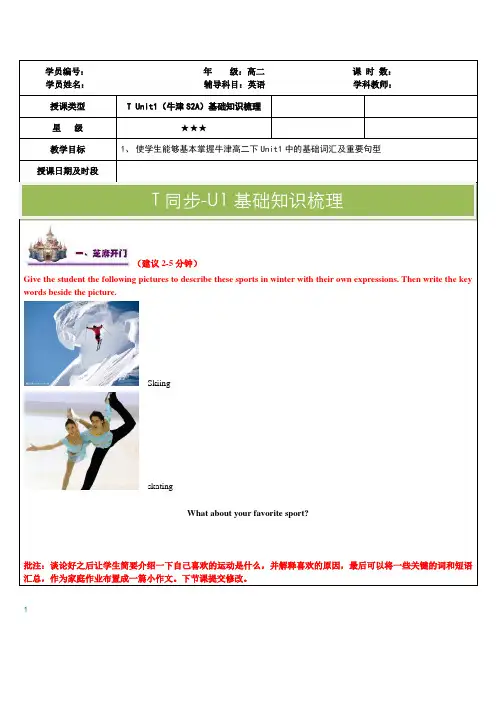
学员编号:年级:高二课时数:学员姓名:辅导科目:英语学科教师:授课类型T Unit1(牛津S2A)基础知识梳理星级★★★教学目标1、使学生能够基本掌握牛津高二下Unit1中的基础词汇及重要句型授课日期及时段T同步-U1基础知识梳理(建议2-5分钟)Give the student the following pictures to describe these sports in winter with their own expressions. Then write the key words beside the picture.SkiingskatingWhat about your favorite sport?批注:谈论好之后让学生简要介绍一下自己喜欢的运动是什么,并解释喜欢的原因,最后可以将一些关键的词和短语汇总,作为家庭作业布置成一篇小作文。
下节课提交修改。
1(建议25分钟)Let’s learn the following language points about sports and try to find out the key words and phrases in the reading and more reading. GO! GO! GO!一、词汇Words1. former adj.以前的;从前的e.g. She chose the former umbrella because of the color. 因为颜色,她选择了以前的雨伞。
【知识拓展】the former 前者the latter 后者e.g. If I have to choose between fish and chicken, I'd like the former.如果我必须在鱼和鸡肉之间作选择,我喜欢前者。
formerly adv.以前,从前e.g. The company formerly belonged to an international banking group.这家公司以前属于一个国际金融组织。
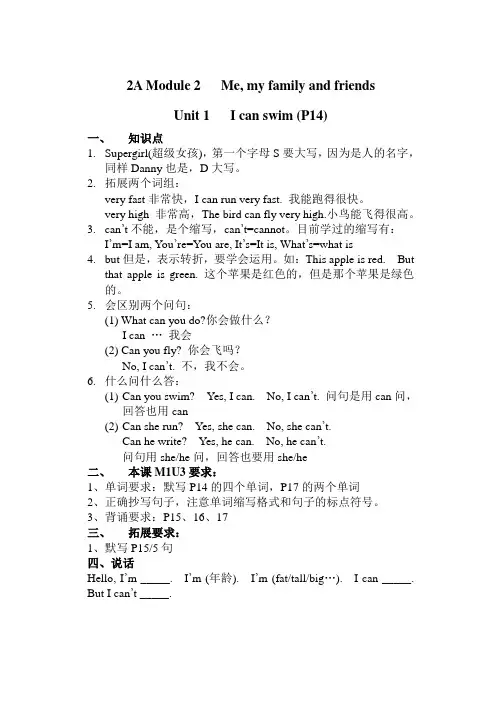
2A Module 2 Me, my family and friendsUnit 1 I can swim (P14)一、知识点1.Supergirl(超级女孩),第一个字母S要大写,因为是人的名字,同样Danny也是,D大写。
2.拓展两个词组:very fast非常快,I can run very fast. 我能跑得很快。
very high 非常高,The bird can fly very high.小鸟能飞得很高。
3.can’t不能,是个缩写,can’t=cannot。
目前学过的缩写有:I’m=I am, You’re=You are, It’s=It is, What’s=what is4.but但是,表示转折,要学会运用。
如:This apple is red. Butthat apple is green. 这个苹果是红色的,但是那个苹果是绿色的。
5.会区别两个问句:(1) What can you do?你会做什么?I can …我会(2) Can you fly? 你会飞吗?No, I can’t. 不,我不会。
6.什么问什么答:(1)Can you swim? Yes, I can. No, I can’t. 问句是用can问,回答也用can(2)Can she run? Yes, she can. No, she can’t.Can he write? Yes, he can. No, he can’t.问句用she/he问,回答也要用she/he二、本课M1U3要求:1、单词要求:默写P14的四个单词,P17的两个单词2、正确抄写句子,注意单词缩写格式和句子的标点符号。
3、背诵要求:P15、16、17三、拓展要求:1、默写P15/5句四、说话Hello, I’m _____. I’m (年龄). I’m (fat/tall/big…). I can _____. But I can’t _____.。
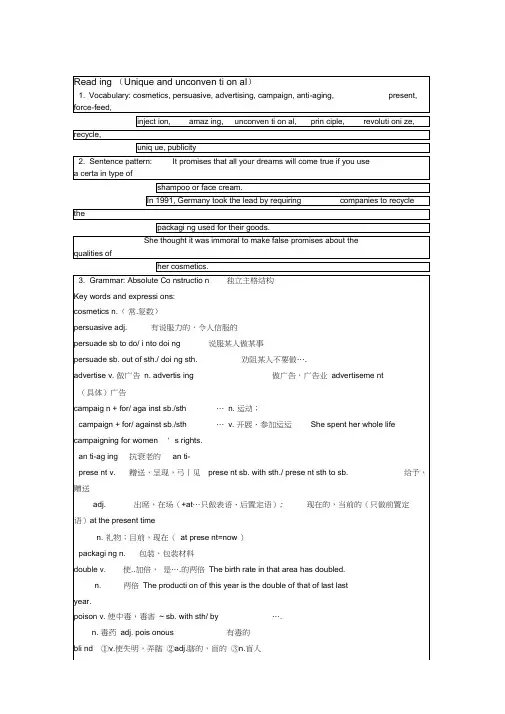
force-feed v. 强迫进食the sick animal refused to eat, and had to be force-fed.injection n. 注射--------- v. inject 给…注射;投入(资金);添加,增加(某种品质)drip v. 滴入amaz ing 令人惊奇的,令人惊喜的unconventional adj. 打破传统的,新奇的------ 反义词:conventional 因循守旧的prin ciple n. 规则,原则、prosper v. 繁荣,使兴旺adj. prosperous n. prosperityrevoluti onize v. 改革,革命n. revoluti onreform n. & v. 改革limitatio n n. 局限,缺陷----- v. & n. limitrecycle v. 回收,再利用refill v. 再装满(灌满)unique adj. 独一无二的,独特的Every snowflake is unique---no tow are the same.每一瓣雪花都是独一无二的。
remarkable adv. 不寻常的,出类拔萃的His remarkable achieveme nt in scie nticehas brougth him great honour.alternative adj. 供选择的,二者择其一的n. 备用物global 全球的n. globe 球,球体the globe=the pla net=the earth 地球publicity n. 公众的注意,媒体的注意;名声,宣传publicize v. n. publicist 宣传人员)hold v. 举办,进行pro-e nvironment adj. 支持环保的sth. come true/ sb. realize sth. 实现(目标,理想)练习:1. Many things impossible for Chin ese to un dersta nd in the past are quitecom mon today.A. con sideri ngB. con sideredC. to be con sideredD. havi ng bee ncon sidered2. might be expected, the resp onse to the questi on was very mixed.A. AsB. ThatC. ItD. What3. The swimmer was very tired but he cross the finishing line.A. couldB. mightC. was able toD. succeeded4. He must be an gry, for we heard the glass on the floor.A. being broke nB. breakC. broke nD. to be broke n5. - What __ to_him ? --He had his leg broken while playing basketball.A. happe nedB. took placeC. broke n outD. washappe ning7. If Harry did not atte nd the conference last ni ght, he too much work todo.A. must have hadB. must haveC. had hadD. had to have had8. I know Jane quite well and n ever doubt she can do a good job for it.A. thatB. whetherC. ifD. whe n9. The official deeply in the case might be sentenced to death.A. i nvolvi ngB. hav ing in volvedC. i nvolvedD. havi ng bee nin volved10. We took our umbrella with us when we went out in order to us from a heavy rainA. banB. prohibitC. preserveD. protect11. The new law will come into on the day whe n it is passed.A. effectB. useC. serviceD. existe nee12. Many coun tries are in creas ing their use of n atural gas, wind and other formsof _______A. orig inB. en ergyC. powerD. source13. China is to be the most developed country sooner or later.A. likelyB. possibleC. probablyD. perhaps14. Where is my pen? I it ?A. might loseB. would have lostC. should have lostD. must have lost15. I didn ' t hear the phone. I asleep. ______A. must beB. must have bee nC. should beD. should havebee n 二.verb-filling1. ___ (feel ) cold, he covered himself with a blanket, _____ (leave) only his arms___ (un cover)2. The gover nment is believed to be con sideri ng _ (pass) a law making it a crime___ (import) any kind of weap on.3. After _______ (technically improve), these trains are capable of attaining a veryhigh speed.4. David, who is helpful and agreeable, is a pers on n ever ___ (ig nore) whereverhe is.5. Only in the past 50 years with the revolution in diving equipment ______ scientists___ (be) able to study deep seas closely.6. With land prices ____ (reduce), I can afford a piece of land big eno ugh to parkmy car on.7. The discovery of new evide nee led to _______________ (the thief, catch)8. _____(meet) the grow ing dema nd for cars, the compa ny ope ned a new factory inthe State of Michigan in 1910.9. The CEOand the designer have overcome a lot of difficulty they had _____________ ( develop)the new project.10. The fireman ______ (rush) to the buildingon fire desperately _______ (hope) to saveas many people ______ (stra nd) in it as possible.11. The old man avoided ____ (touch) the hands __ (hold) out to help him as he___ (step) out of the boat.12. --Sorry _______ (interrupt) you. Please go on.--Where was I ?--You ________ (say) you didn ' t like your father ' s job. arrived13. The air liner from Beijing1. Do n't get off the bus un til it _____ .A. stopB. will stopC. stoppedD. has stopped2. "Where ____the recorder? I can't see it any where." "I ___ it right here. Butnow it's gone."A. did you put/have put C. had you put/was putt ing 3. Don't come toni ght. I would rather youA. come 4.B. cameB. have you put/put D. were you putt in g/have put tomorrow.C. will comeD. coming _____ you __A. Do/marry Are/marriedB. Have/marriedC. Have/bee n marriedD.5. When heall the n ewspapers, he'll go home.B. has soldC. will have sold 6. "Hurry up, you _____ on the pho ne. " "Oh, I'm coming. Thank you." A. are wan ted B. are being wan tedC. want 7. I _____ see you, but I did n't, for I had no time. A. had wan ted to B. has wan ted to C. wan ted 8. I _____ in Guang Zhou for six years by this October.A. have livedB. was livi ngC. will be livi ngA. sells D. will be sold D. are wan ti ng D. was wan tedD. shallhavelived9. By this time next year he _____ from the college.A. will be graduat ingB. should be graduati ngC. will have graduatedD. is graduati ng10. Our teacher told us that the earth _____ from west to east.A. turnsB. turnC. has turned11. It is high time you ____ in bed now.A. areB. were12. After a while an agreeme nt ____ .A. was arrived atB. was arrived inC. will beD. had tur nedD. would beC. was arrivedD. hasbee nat 3:00 .A. is about to arriveB. has arrivedC. arrivesD. is going to arrive 14. The research laboratory is going to _____ the new type of computer to use. A. take B. makeC. putD. send15. I ____ that he would be able to leave tomorrow, but it's begi nning to lookdifficult. A. hopeB. had hopedC. hopedD. am hop ing16. This liquid ____ the salt at room temperature.A. became mixed withB. was mixed byC. mixes withD. has bee n mixing by17. If they ___ e arlier tha n expected, they ____ h ere now.A. had started, would beB. started, might beC. had started, would have bee nD. will start, might have bee n18. Were I to do it, I ________ i t some other way.A. will doB. would doC. would have doneD. were to d19. We wish we ___ what you did whe n we were at high school.to the theatre last ni ght. B. would go C. had gone1. 我不知是否有任何东西可以取代母爱和关怀。
高中英语新高考-教材课文复习讲义:牛津模块1Unit 2单词语篇记忆和讲解(考前复习版)一、短文朗诵Adolescence (1)carefully.随同青春期的到来是青少年的生理和心理的变化。
现在,我们迫不及待地去追寻独立和自由。
我们不再和父母聊天,这让他们困惑不安。
我们之间于是经常有冲突。
特别是争吵过后,我们会保持冷漠,坚持我们的要求被满足。
他们最终对我们加以限制。
个人之见,我们应该32. Everyone should be allowed freedom of choice.每个人都应享有自由选择的权利。
33. Local people are worried by the rise in crime.当地人因犯罪活动有所抬头而忧心忡忡。
34. Bad books do more harm to people than bad friends. 壞書比壞朋友害處更大。
35. It is clear that smoking is harmful to health.很明显,抽烟对健康有害。
36. It would be foolish of you to change your mind now. 现在改变主意非常愚蠢。
37. It takes time and patience to photograph wildlife. 拍摄野生动物要肯花时间,要有毅力。
38. It was selfish of him to leave all the work to you. 他把所有的工作都推给你,真是自私。
39. The time we spent together is now a distant memory. 我们一起度过的时光现已成为久远的记忆。
40. I was so annoyed with him for turning up late.他姗姗来迟,我很生气。
41. He is forbidden from leaving the country.他被限制出境。
Unit 1 Words and Their StoriesLesson 1【学习目标】1.能够基本掌握词汇、词组、句型及语法。
2.牢记各个知识点的用法,归纳总结异同点,通过习题加强巩固。
【学习重难点】1.能熟练运用单词、短语、句型。
2.能背诵课文中的重点句型或句子。
【学习过程】I. Grammar and vocabulary1.High efficiency mainly _______ a good plan and hard-working spirit.A.consists of B.consists in C.includes with D.compare with 2.In spite of all the efforts we make, we will always _______ our parents' expectations.A.fall short of B.fall out of C.run out of D.run over3.According to doctors, some diseases _______ the category of stress-related illnesses.A.fall into B.fall off C.fall on D.fall back4._______from the fifth floor when the police arrived.A.Jumped down the burglar B.Down the burglar jumpedC.Down jumped the burglar D.Down did the burglar jump5.Some of us wondered _______ that made Jamie, an ordinary-looking young girl with no talent for sports, one of the most popular students on campus.A.what was it B.why it was C.what it did D.what it was 6.In 1852, South Carolina surgeon Dr. Hugh H. Toland joined a wagon train heading _______ in search of gold and a healthier climate for his ailing wife.A.to west B.the west C.for west D.west7.It was the A/N1H1 epidemic _______ spread almost throughout the country_______ promoted the research and production of the flu vaccine.A.that… that B.that…which C.what…that D.that…what8.–What’s your impression _______ the speech he delivered last week?–If only he had employed some proper gestures and facial expressions!A.to B.of C.on D.in9.The audience will be incapable of following what you are talking about even if you are introducing an interesting topic _______ you pronounce every word in a clear manner.A.once B.unless C.in case D.as long as 10.It is quite a time _______ Yao Ming got injured, and many fans both at home and abroad hope it won’t be long _______ he returns to the court.A.before, since B after, when C.since, before D.that, whenII. Verb1.We often talk a great deal about English language teaching, __________ (forget) that it is the learning that really matters.2.__________ (find) out more about the schedule of the tournament this year, call Hotline +86-21-962010.3.Disneyland Shanghai, __________ (schedule) to open in 2016 in the Pudong district made famous by the World Expo in 2010, will be Burbank-based Disney’s sixth theme park around the world.4.Cole Beetles __________ (reject) by a number of universities when he received an e-mail from Oxford University.5.__________ (visit) London several times, Mary offered to act as our guide.III. Word1.The first known _________ (settle) in this area was on the banks of this river.2.The United Nations _________ (secret) is one of the principal organs of the United Nations.3.He was _________ (honesty) with me so I had no choice but to break up with him.4.When confronted with any evidence, the _________ (historic) has to establish its reliability.5.I'm sure it makes every effort to do so, but in an imperfect world, these decisions get mighty _________ (trick).6.Industrial prices had risen three times more quickly than _________ (agriculture) ones.7.The parent can _________ (assignment) a responsible person to accompany their childrenunder 12 on the airplane.8.Peter and I have been working together for twenty years. He is _________ (truth) a unique partner.9.Technology gave _________ (birthday) to new forms of communication.10.Unlike last year's terrible weather, it's _________ (usual) cool this late summer.IV. 选词填空:1.Opposition leaders are denying any___________with the rebel government.2.We are doing this work in the___________of reforms in the economic, social and cultural spheres.3.Few___________ in the recent history of British boxing have been as thrilling.4.The sunburnt grass breathed a harvest breath of dry sweetness and___________.5.He was given a seven-year___________with an annual salary of $150,000.6.I emptied the___________ of the fridge into carrier bags...7.New research shows that an excess of meat and salt can___________muscles.Unit 1 Words and Their StoriesLesson 2【学习目标】1.能够基本掌握词汇、词组、句型及语法。
学员编号:年级:高二课时数:学员姓名:辅导科目:英语学科教师:授课类型T 词汇牛津高二下U1 C 长难句分析T 综合能力提升授课日期及时段教学内容一、词汇Words1、重点单词1. former adj.以前的;从前的She chose the former umbrella because of the colour. 因为颜色,她选择了以前的雨伞。
Bill Clinton, the former president of the USA, was born in 1946.美国前总统比尔·克林顿出生于1946年。
【拓展】the former 前者the latter 后者If I have to choose between fish and chicken, I'd like the former.如果我必须在鱼和鸡肉之间作选择,我喜欢前者。
formerly adv.以前,从前The company formerly belonged to an international banking group.这家公司以前属于一个国际金融组织。
2. lecturer n.讲师The lecturer had a wide range of knowledge, and a good sense of humour, as well.那位讲师不仅知识面广,而且富有幽默感。
3. compliment n.赞扬;称赞【搭配】compliment on sth. 对……的赞美,赞成Mary likes to hear compliments on her appearance.玛丽喜欢听对她仪表的赞美之词。
After class the teacher expressed her compliments on my writing.老师课后对我的写作大加赞扬。
【拓展】compliments n.致意,问候,祝贺(常用于传达音讯)My compliments to your wife.向你的夫人表示问候。
e.g. Little did he say at the meeting.Never shall I forget the day when I joined the Army.比较:I shall never forget the day when I joined the Army.7、用于以only所修饰的副词、介词短语或状语从句的句子中。
e.g. Only when the war was over in 1918 was he able to get happily back to work.Only in this way can we learn English well.注意:如果only后的词组不是状语,不需倒装。
e.g. Only Wang Lili knows this.8、为了表达生动,有时把表地点、方位的副词,如up, down, out, away, in等放在句首,同时把谓语动词放在主语之前。
若主语为人称代词,主语和谓语动词的位置不变,只将副词放在句首。
(完全倒装)e.g. Away hurried the boy.Out rushed the girl.9、在虚拟结构中,条件从句的谓语含有were, had 和should这三个词时,可省去if,将这些词移至主语之前。
e.g. Had I time (= If I had time), I would go and help you.Were I you (= If I were you), I would go abroad.Should he come (=If he should come), tell him to ring me up.10、as引导让步状语从句时要倒装(形容词/ 副词/ 名词/ 动词+ as + 主语+ 谓语)。
e.g. Proud as they are, they are afraid to see me.Child as he is, he seems to know everything.(child前不加冠词)Hard as he worded, he made little progress.11、用于某些表示祝愿的句子里。